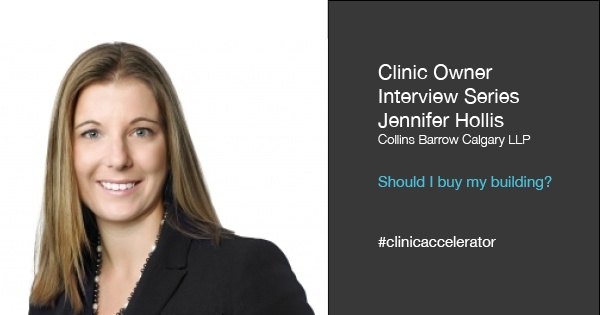In my Clinic Accelerator Program where I coach clinic owners to run more efficient, effective businesses, I constantly get asked about negotiating a lease versus buying a clinic building.
This really is an awesome topic to cover. Think about it.
If you own your clinic for 20 years, you really could pay off your mortgage for your clinic – especially if you are in your mid-40s or below. By doing so you’d be building two assets: the business and the commercial property associated with it.
Let’s take McDonald’s as an example. It’s not just their food and fast service that has made the company a massive worldwide success. It’s actually due to their acquisition of real estate as a main component of their business model that has led to their rapid growth and ongoing success over the years.
So, if your lease is coming up and you have an opportunity to buy a commercial space, is it really worth considering?
It could be.
And I’ve got the perfect expert to help go over some of the important aspects to consider – meet Jennifer Hollis.
Jennifer is a partner at Collins Barrow that provides accounting, audit, taxation and general business consultant services. She works with companies both large and small and specializes in the health and fitness and real estate industries, so she can share some powerful insights about exactly what the benefits of leasing vs buying really are.
I got introduced to Jennifer Hollis by Wendy Coombs from Momentum Health in Calgary. Wendy thought Jennifer could really help contribute some awesome tips that could help clinic owners make better financial decisions.
So let’s turn to Jennifer for some words of wisdom and advice on this popular topic.
Lease versus Buy: An Investment Decision
What is one key point clinic owners should consider when deciding to lease vs. buy?
The key point in deciding whether to continue to lease the premises or purchase a commercial building is that it should be viewed as it’s own investment decision separate from operating your clinic.
For example, imagine, aside from being a clinic owner, you are a commercial landlord. The decision to purchase the property would be based around owning and managing a second business. The real estate investment must generate a positive return on investment (ROI) in order for the purchase to make sense as an investment.
The rent that the clinic pays to the real estate company should not be significantly different from the current operating costs in order to generate this positive ROI.
Lease versus Buy: Other Factors
What are the top 5 factors clinic owners should consider?
1. Diversity in your portfolio
Similar to how you invest in stocks and bonds, you want to ensure that your investments are diversified. As the clinic owner, you have already significantly invested in your clinic. If you now invest in a building and your ROI is based on rental revenue from the clinic; your return on this investment is based heavily on your clinic profit as well.
However, if the building earns rental income from other sources and can operate as a stand-alone business, then this contributes to diversification – meaning it can be beneficial to purchase a property where you can rent out sections to tenants other than your clinic.
2. Becoming a commercial landlord
The purchase of the building results in you becoming a second business owner – the commercial landlord. This leads to many responsibilities, more so if you have multiple tenants.
You now have to manage vacant space, tenant concerns, negotiate lease agreements, deal with municipality, manage liability risks as a building owner, among other things. Of course you can engage a property manager to assist with some of these responsibilities, but this cost reduces your profit from the investment.
There are also additional costs that need to be considered such as potential operating cost audit requirements, property taxes, repairs and maintenance, insurance, property managers and finance costs.
Being a commercial landlord is no small task and needs to be carefully researched and considered in the decision to purchase a building.
3. Incorporating a second company (‘newco’)
There is a theme here that is being repeated throughout all these considerations.
This decision should be considered as a separate financial decision from your business.
As such, we generally recommend to our clients that the purchase of a building be done in a separate company.
This has many purposes:
- It helps separate the liability concerns of each business from the other for asset protection.
- It provides greater flexibility in the negotiations of any future sale of either business – the clinic or the building.
- It could provide tax planning opportunities between the two companies.
4. Operational Control
If you intend to occupy the building then the location of the building being acquired is a key factor. Although the decision to lease or buy space should be a separate financial decision; there are non-financial considerations that will impact profit for both businesses.
If your prime location is an area that you cannot afford to purchase a building, then you need to determine the impact that will have on the clinic revenues as well as your vacancy rates. Leasing a building provides you with the flexibility to potentially move if the location is not the right fit for the clinic.
Being a landlord also gives you some flexibility to choose your tenants. There is the potential to lease to tenants who could provide great synergies for your clinic. Possibly a fitness studio, a doctor’s office or other clinics – if you operate in one medical practice (e.g. physiotherapy and yoga studio or chiropractor and massage clinics). You likely also have more control over the exterior, signage and common areas of the building.
5. Return on Investment (‘ROI’)
Given the sizeable down payment and financing costs of this purchase, you want to ensure that this investment is meeting your expected ROI. Similar to other investment decisions, it can be difficult to separate the emotional element of purchasing your own building for your business from the investment decision.
You should determine an expected ROI that you would like to obtain and also consider the ROI that you are losing by choosing this investment versus another (i.e. stocks, bonds, etc).
The financing of the building is typically through a traditional mortgage. There could also be personal guarantees required and/or the clinic may have to provide a guarantee to obtain the mortgage (depending on the size and nature of the loan). The purchase of a commercial building requires a sizeable down payment (typically we see 20-25%), which could be loaned to newco either personally or from the clinic as an intercompany loan.
The rent and operating costs that the clinic pays to newco becomes part of that ROI along with third party rent received. You want to ensure that you meet this ROI requirement while maintaining the rent and operating costs paid by the clinic at between 12-18% of the clinic revenues. This will ensure that your clinic operations are not significantly impacted by this investment decision.
These are not all of the considerations when deciding whether to purchase a building or continue to lease as each situation is unique.
However, as a consultant, these are the things that have a large impact on your decision and should be carefully considered.
It’s also recommended that you consult with your accountant and financial advisor when considering purchasing a commercial building. They can help you structure this investment in the most advantageous way for financial and tax considerations.
You can also contact Jennifer Hollis to discuss any questions you may have.



